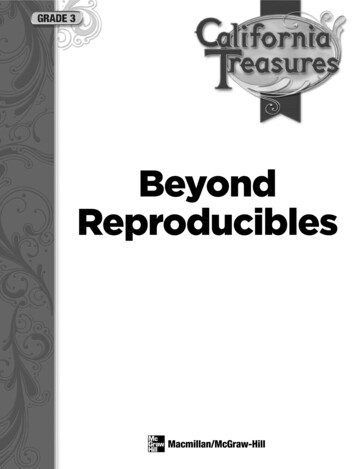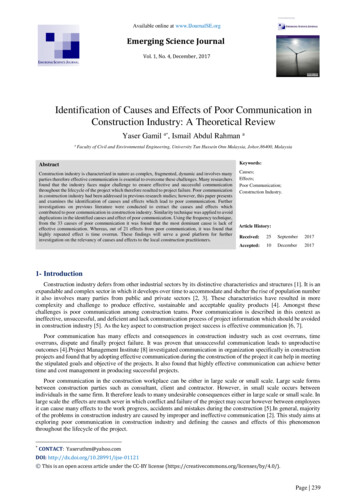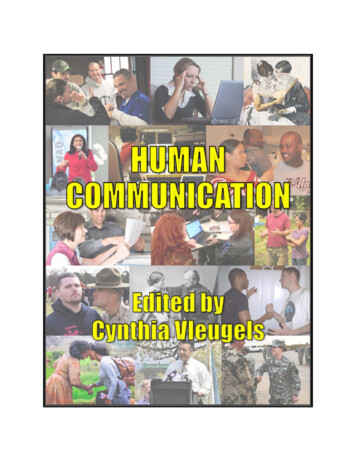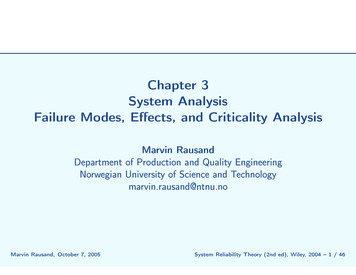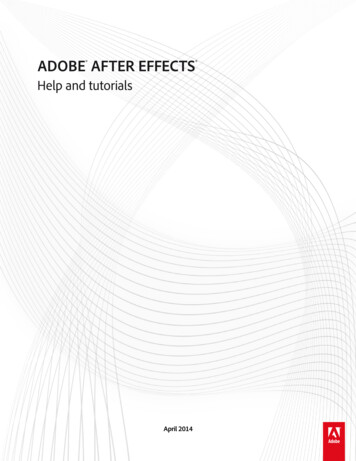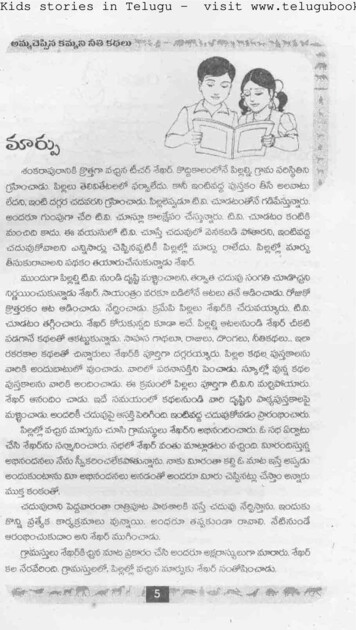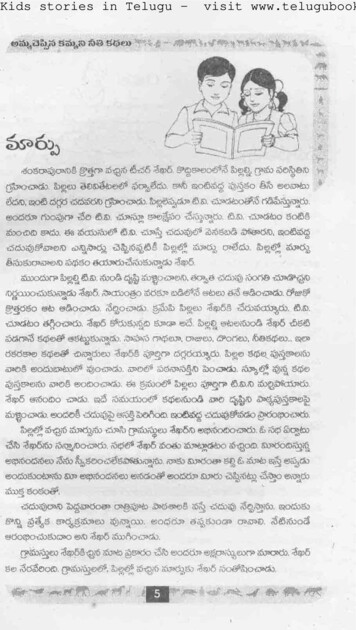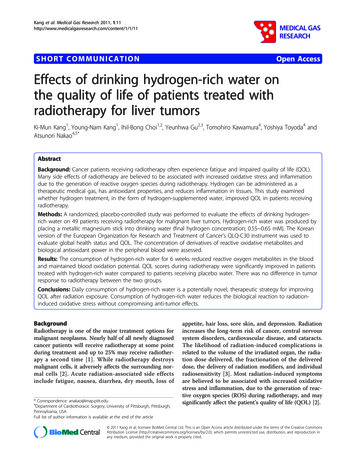
Transcription
Kang et al. Medical Gas Research 2011, 11SHORT COMMUNICATIONMEDICAL GASRESEARCHOpen AccessEffects of drinking hydrogen-rich water onthe quality of life of patients treated withradiotherapy for liver tumorsKi-Mun Kang1, Young-Nam Kang1, Ihil-Bong Choi1,2, Yeunhwa Gu2,3, Tomohiro Kawamura4, Yoshiya Toyoda4 andAtsunori Nakao4,5*AbstractBackground: Cancer patients receiving radiotherapy often experience fatigue and impaired quality of life (QOL).Many side effects of radiotherapy are believed to be associated with increased oxidative stress and inflammationdue to the generation of reactive oxygen species during radiotherapy. Hydrogen can be administered as atherapeutic medical gas, has antioxidant properties, and reduces inflammation in tissues. This study examinedwhether hydrogen treatment, in the form of hydrogen-supplemented water, improved QOL in patients receivingradiotherapy.Methods: A randomized, placebo-controlled study was performed to evaluate the effects of drinking hydrogenrich water on 49 patients receiving radiotherapy for malignant liver tumors. Hydrogen-rich water was produced byplacing a metallic magnesium stick into drinking water (final hydrogen concentration; 0.55 0.65 mM). The Koreanversion of the European Organization for Research and Treatment of Cancer’s QLQ-C30 instrument was used toevaluate global health status and QOL. The concentration of derivatives of reactive oxidative metabolites andbiological antioxidant power in the peripheral blood were assessed.Results: The consumption of hydrogen-rich water for 6 weeks reduced reactive oxygen metabolites in the bloodand maintained blood oxidation potential. QOL scores during radiotherapy were significantly improved in patientstreated with hydrogen-rich water compared to patients receiving placebo water. There was no difference in tumorresponse to radiotherapy between the two groups.Conclusions: Daily consumption of hydrogen-rich water is a potentially novel, therapeutic strategy for improvingQOL after radiation exposure. Consumption of hydrogen-rich water reduces the biological reaction to radiationinduced oxidative stress without compromising anti-tumor effects.BackgroundRadiotherapy is one of the major treatment options formalignant neoplasms. Nearly half of all newly diagnosedcancer patients will receive radiotherapy at some pointduring treatment and up to 25% may receive radiotherapy a second time [1]. While radiotherapy destroysmalignant cells, it adversely affects the surrounding normal cells [2]. Acute radiation-associated side effectsinclude fatigue, nausea, diarrhea, dry mouth, loss of* Correspondence: anakao@imap.pitt.edu4Department of Cardiothoracic Surgery, University of Pittsburgh, Pittsburgh,Pennsylvania, USAFull list of author information is available at the end of the articleappetite, hair loss, sore skin, and depression. Radiationincreases the long-term risk of cancer, central nervoussystem disorders, cardiovascular disease, and cataracts.The likelihood of radiation-induced complications isrelated to the volume of the irradiated organ, the radiation dose delivered, the fractionation of the delivereddose, the delivery of radiation modifiers, and individualradiosensitivity [3]. Most radiation-induced symptomsare believed to be associated with increased oxidativestress and inflammation, due to the generation of reactive oxygen species (ROS) during radiotherapy, and maysignificantly affect the patient’s quality of life (QOL) [2]. 2011 Kang et al; licensee BioMed Central Ltd. This is an Open Access article distributed under the terms of the Creative CommonsAttribution License (http://creativecommons.org/licenses/by/2.0), which permits unrestricted use, distribution, and reproduction inany medium, provided the original work is properly cited.
Kang et al. Medical Gas Research 2011, 11Hydrogen, a therapeutic medical gas, has antioxidantproperties and reduces inflammatory events in tissues[4-6]. Drinking liquids supplemented with hydrogenrepresents a novel method of hydrogen gas delivery thatis easily translatable into clinical practice, with beneficialeffects for several medical conditions, including atherosclerosis, type 2 diabetes, metabolic syndrome, and cognitive impairment during aging and in Parkinson’sdisease [7-11]. Currently, there is no definitive therapyto improve the QOL of patients receiving radiotherapy.Drinking solubilized hydrogen on a daily basis may bebeneficial and would be quite easy to administer withoutcomplicating or changing a patient’s lifestyle. Wehypothesized that oral intake of hydrogen-rich water,generated via a magnesium stick, would reduce adverseevents in patients receiving radiotherapy.MethodsSubjects and designThe study was a two-arm, randomized, controlled clinical trial. Patients were randomly assigned to receiveeither hydrogen-rich water or placebo water on the firstday of radiation treatment, and received follow-up questionnaires on compliance and potential adverse effects.Eligible patients were informed of the study duringscheduling of pre-radiation testing. Patient characteristics, including tumor origin and the specifics of radiotherapy, are listed in Table 1. Forty-nine subjects (33men and 16 women) were enrolled between April andOctober 2006. The age of the patients ranged from 21to 82 years (mean age 58.6 years). All patients werediagnosed either histologically or pathologically withhepatocellular carcinoma (HCC) or metastatic hepatictumors. All participants received 5040-6500 cGy ofradiotherapy for 7-8 weeks using a 6 MV system (CyberKnife, Fanuc, Yamanashi, Japan). The planned targetvolume of the initial field was assessed by a localization/simulation procedure or by computed tomography(CT)-assisted planning and encompassed the primarytumors and a 2 cm margin. Blocks were used to shieldnormal tissue.Hydrogen-rich water was produced by placing ametallic magnesium stick (Doctor SUISOSUI , Friendear, Tokyo, Japan) into drinking water (Mg 2H2O Mg (OH) 2 H 2 ; final hydrogen concentration:0.55 0.65 mM). The magnesium stick contained 99.9%pure metallic magnesium and natural stones in a polypropylene and ceramic container. The subjects wererandomly assigned to groups to either drink hydrogenrich water for 6 weeks (n 25) or drink water containing a placebo (a casing-only stick placed in drinkingwater) (n 24). Subjects were provided with four 500mL bottles of drinking water per day and instructed toplace two magnesium sticks in each bottle of water atPage 2 of 8the end of each day in preparation for consumption thefollowing day. Participants were asked to drink 200-300mL from one bottle each morning, and 100-200 mLevery a few hours from the remaining three bottles. Subjects were instructed to reuse the magnesium sticks bytransferring the sticks to a new bottle of water after use.The subjects were expected to consume 100-300 mL ofhydrogen-rich water more than 10 times per day for atotal minimum consumption of 1500 mL (1.5 L) and amaximum consumption of 2000 mL (2.0 L). Oral intakeof hydrogen water or placebo water started on the firstday of radiotherapy and continued for 6 weeks. All thepatients survived through the 6 week follow-up periodwhen the QOL questionnaire was administered. Thisstudy was conducted in accordance with Good ClinicalPractice guidelines and the ethical principles of theDeclaration of Helsinki (2000). The study protocol andmaterials were approved by the Institutional ReviewBoard of Catholic University Medical College, and allsubjects provided written informed consent prior toparticipation.QOL AssessmentThe Korean version of the European Organization forResearch and Treatment of Cancer’s QLQ-C30 instrument with modifications was used to evaluate globalhealth status and create QOL scales [12]. The descriptive, mailed survey developed by our institute was usedin this study. The questionnaire contains five functionalscales (physical, cognitive, emotional, social, and rolefunctioning), three symptom scales (pain, fatigue, andnausea/vomiting), and six single items to assess additional symptoms (dyspnea, insomnia, loss of appetite,constipation, diarrhea). For all items, a response scaleranging from 0-5 was used. A higher score reflected ahigher level of symptoms and decreased QOL. Assessments were performed before radiotherapy and everyweek for 6 weeks after the initiation of radiotherapy.Biomarker analysisThe concentrations of derivatives of reactive oxidativemetabolites (dROMs) and biological antioxidant power(BAP) in the peripheral blood were assessed using a freeRadical Analytical System (FRAS4; H&D, Parma, Italy)on the first day of radiation therapy (week 0) and after 6weeks of radiotherapy. Blood samples were obtainedfrom all patients after overnight fasting. FRAS4 dROMskits were used to measure total hydroperoxide levels,which are representative of the total dROMs producedas a result of peroxidation chain reactions of proteins,lipids, and amino acids. Results were expressed in U.CARR; 1 U.CARR is equivalent to 0.08 mg/dl of hydrogen peroxide and the value is directly proportional tothe concentration, according to Lambert-Beer’s law.
waterAge gender times er response(cc)water age gender times er NRHW52M3liver metaof colonca743,60012.28315NR2 placebo82M1HCC701,20011.76920CRHW56M3liver metaof colonca853,6002.55212.5PR3 placebo57F3bile ductca803,00040.33430PRHW77F3liver metaof colonca753,000107.13620CR4 placebo47F9liver meta.of NRHW57M3HCC703,60047.67915NR5 placebo50F3liver metaof 6 placebo21F3liver meta.of NR7 placebo65M3liver meta.of R8 placebo73M3liver meta.of 5PR9 placebo58M3liver 003.86110NR10 .28615NR11 placebo65F3HCC703,60048.64525PRHW45F3liver meta.of gastricca853,00038.93815PR12 tasisof HCC803,6009.49415PR13 asisof HCC753,00091.22320NR14 f HCC753,000120.36625NRPage 3 of 81 placeboKang et al. Medical Gas Research 2011, 11Table 1 Patient Characteristics
15 placebo4616 placebo17 placeboCRHW3LNmetastasisof 50HW4918 placebo48M3HCC853,00035.09320NRHW19 placebo76F3HCC853,6005.7515NRHW20 placebo60M3HCC833,6006.80212.5NRHW67F3HCC21 placebo77M3HCC753,30033.28225PRHW56M3HCC22 placebo55M3HCC833,60011.96320NRHW78F3HCC23 placebo57M3HCC703,00075.78240NRHW56M3HCC24 5NR3,60029.42220NR3,000156.28940PRKang et al. Medical Gas Research 2011, 11Table 1 Patient Characteristics (Continued)M: male, F: female, HCC: hepatocellular carcinoma, NR: no response, PR: partial response, CR: complete response, HW: hydrogen water.Page 4 of 8
Kang et al. Medical Gas Research 2011, 11Assessment of responsePatients underwent dynamic CT scans 1-2 months aftercompletion of radiation treatment and tumor responsewas checked at 2-3 month intervals thereafter. Treatment response and local recurrence were evaluatedusing follow-up dynamic CT scans and serum tests foralpha-fetoprotein (AFP) and prothrombin, which isinduced by vitamin K absence or antagonist-II (PIVKAII). Tumor response was determined by the criteriaestablished by Kwon et al. [14]. Described briefly, complete response (CR) was defined as the disappearance ofany intratumoral arterial enhancement in all targetlesions. Partial response (PR) was defined as at least a30% decrease in the sum of the diameters of viable target lesions. Progressive disease (PD) was defined as anat least 20% increase in the sum of the diameters ofviable target lesions or the appearance of a new lesion.Stable disease (SD) was defined as a tumor status thatdid not meet any of the above criteria.radiotherapy (Figure 1A). There were no differencesbetween the groups in the QOL subscales for fatigue,depression, or sleep. Gastrointestinal (GI) symptoms areone of the most common complaints of patients undergoing radiotherapy and are considered to have a highimpact on the patient’s QOL after 6 weeks of radiotherapy. The patients consuming hydrogen water experienced significantly less appetite loss and fewer tastingdisorders compared to the patients consuming placebowater. No significant difference was seen in the meanscores for vomiting or diarrhea (Figure 1B).Hydrogen water mitigated oxidative stress marker duringradiotherapyBefore treatment, there were no differences in total hydroperoxide levels, representative of total dROM levels,between the treatment groups. Radiotherapy markedlyincreased total hydroperoxide levels in the patients consuming placebo water. However, drinking hydrogen waterprevented this increase in total serum hydroperoxide, asdetermined by the dROM test (Figure 2A), indicatingdecreased oxidative stress during radiotherapy in theA9876QOL scoreRedox potential, including glutathione peroxidase andsuperoxide dismutase, were determined using theFRAS4 BAP test [13]. Described briefly, the samples tobe tested were dissolved in a colored solution containinga source of ferric ions and a chromogenic substance (asulfur-derived compound). After a 5-minute incubationperiod, the degree of discoloration and intensity of thechange were directly proportional to the ability of theplasma to reduce ferric ions. The amount of reducedferric ions was calculated using a photometer to assessthe intensity of discoloration; BAP results wereexpressed as µmol/l of reduced Fe/l.Blood chemistry tests for aspartate aminotransferase,alanine aminotransferase, gamma-glutamyl transpeptidase (g-GTP), and total cholesterol, as well as bloodhematology tests for red blood cell count, white bloodcell count, and platelet count were conducted at week 0and week 6 using standard assays in an accredited hospital laboratory.Page 5 of 8ResultsHydrogen water improved the QOL of patients receivingradiotherapyThe QOL of the patients who were given placebo waterdeteriorated significantly within the first month ofPlacebo water4Hydrogen water*3**21012345Weeks after initiation of radiotherapy6BPlacebo waterHydrogen water3.0Symptom scoreStatistical analysisUnpaired t tests were used to compare numerical dataand the Yates 2 x 2 chi-square test or Fisher exact probability test was used to compare categorical data. Statistical analyses were performed using SAS 6.13 software(SAS Institute Inc., Cary, NC). The sample size of 49patients was sufficient to detect a change in mean scoresof RORTC rheatastingdisorderFigure 1 Placebo water and hydrogen water improved theQOL of patients receiving radiotherapy. A. Weekly assessment ofthe patients’ QOL. B. Scoring system of GI symptoms after 6 weeksof radiotherapy with or without hydrogen water.
Kang et al. Medical Gas Research 2011, 11APage 6 of 8water did not compromise the anti-tumor effects ofradiotherapy.B**3000Hydrogen treatment did not alter liver function or bloodcomposition during radiotherapyBAP (µmol/L)dROMs (U.CARR)60040020001000200week 0week 6Placebo waterweek 0week 6Hydrogen waterFigure 2 Hydrogen water mitigated oxidative stress markerduring radiotherapy. Antioxidative effects in patients with placebowater (n 24) and hydrogen rich water (n 25). The dROM level(A) represents the total level of peroxide metabolities, and BAP (B)reflects serum antioxidant capacity.patients who consumed hydrogen water. Similarly, endogenous serum antioxidant activity significantly deteriorated during radiotherapy in the patients consumingplacebo water, and biologic antioxidant activity was maintained in patients who consumed hydrogen-rich water,even after 6 weeks of radiotherapy (Figure 2B).Hydrogen water did not compromise the radiationtreatment efficaciesTumor response to radiotherapy was similar betweenthe treatment groups, and 12 of 24 (50.0%) patients inthe placebo group and 12 of 25 (48%) patients in hydrogen water group exhibited either a completed response(CR) or a partial response (PR). There were no patientsin either group with progressive disease (PD) during thefollow-up period (3 months). Thus, drinking hydrogenThere were no significant differences in aspartate aminotransferase, alanine aminotransferase, gamma-glutamyl transpeptidase (g-GTP) and total cholesterol levelsat week 0 and week 6, regardless of the type of waterconsumed (Table 2), indicating that hydrogen waterconsumption did not alter liver function. Similarly, therewere no significant differences in red blood cell count,white blood cell count, or platelet count betweenpatients consuming hydrogen water and patients consuming placebo water (Table 3).DiscussionTo our knowledge, this is the first report demonstratingthe benefits of drinking hydrogen water in patientsreceiving radiation therapy for malignant tumors. Thisfinding may provide the foundation for a clinicallyapplicable, effective, and safe strategy for the delivery ofhydrogen gas to mitigate radiation-induced cellularinjury. Patients experience GI symptoms and decreasedQOL during radiotherapy. These symptoms usuallyoccur as a result of the body repairing damage tohealthy cells, are particularly common towards the endof a course of radiation treatment, and can last for sometime. The symptoms and their impact on QOL can beworsened by having to travel to the hospital each day.Drinking hydrogen-rich water improved the QOL of thepatients receiving radiotherapy and did not require additional hospital visits. Although overall survival ofpatients with malignant tumors should remain oncologists’ primary concern, survival should also be interpreted in light of symptom palliation and overall QOL,Table 2 Changes in liver function testsPlaceboHydrogen waterall (n 25)male (n 17)female (n 8)all (n 25)male (n 16)female (n 9)Week 024.8 9.125.6 5.723.1 10.425.3 6.725.9 5.323.9 8.3Week 626.3 6.726.9 7.125.4 6.826.8 8.227.2 9.926.4 5.1Week 027.4 1528.1 1126.5 1726.9 8.727.1 6.726.7 10.3Week 628.8 1428.7 1627.6 1228.1 6.528.8 7.327.6 9.9Week 061.9 54.362.3 35.660.5 64.762.3 26.262.1 34.862.4 47.9Week 662.8 22.863.2 16.562.7 25.963.6 36.263.9 54.263.2 27.4Week 024.8 9.125.6 5.723.1 10.425.3 6.725.9 5.323.9 8.3Week 626.3 6.726.9 7.125.4 6.826.8 8.227.2 9.926.4 5.1AST(IU/L)ALT(IU/L)g-GPT(IU/L)AST(IU/L)
Kang et al. Medical Gas Research 2011, 11Page 7 of 8Table 3 Peripheral blood cell countsPlaceboHydrogen waterall (n 25)male (n 17)female (n 8)all (n 25)male (n 16)female (n 9)Week 055.8 15.658.5 12.752.8 16.456.2 16.757.3 17.255.4 15.1Week 653.9 21.454.1 22.753.7 19.854.7 28.755.1 31.253.8 19.4Week 0474.2 38.3492.3 45.8460.8 30.5482.5 42.1496.6 50.7472.9 36.4Week 6462.1 52.4473.8 42.1456.4 62.2479.5 36.5486.4 29.4470.7 40.5The number of thrombocytes ( 104 /μL)Week 025.7 6.526.4 4.724.7 5.926.4 7.126.9 5.526.1 4.8Week 624.5 4.725.9 2.823.4 6.425.7 4.826.1 4.725.3 3.9The number of leukocytes ( 102 /μL)4The number of erythrocytes ( 10 /μL)because the side effects of radiotherapy may negate theputative benefit of improved survival. Oral intake ofdaily hydrogen-supplemented water might be a prophylactic strategy to improve QOL of the patients receivingradiotherapy.Although the mechanisms underlying the beneficialeffects of hydrogen-rich water during radiotherapy havenot been clearly elucidated, drinking hydrogen-supplemented water reduced dROM levels and maintainedBAP levels in the serum, suggesting hydrogen-rich waterexhibits potent systemic antioxidant activity. Previousexperimental studies have linked daily consumption ofhydrogen-rich water with improvement of a number ofconditions in rodent models, including reducing atherosclerosis in apolipoprotein E knockout mice [10], alleviating cisplatin-induced nephrotoxicity [15], reducingvitamin C deficiency-induced brain injury [16], preventing chronic allograft nephropathy after renal transplantation [17], and ameliorating cognitive defects insenescence-accelerated mice [9] and a Parkinson’s disease model [7]. In human studies, consumption ofhydrogen-rich water prevented adult-onset diabetes andinsulin resistance [11], as well as oxidative stress inpotential metabolic syndrome [8].Radiotherapy is associated with an increase in ROS, followed by damage to DNA, lipids, and proteins, and activation of transcription factors and signal transductionpathways. It has been estimated that 60-70% of the ionizing radiation-induced cellular damage is caused byhydroxyl radicals [18]. Therefore, a number of trials withthe goal of reducing adverse effects due to excess ROSproduction have been performed with antioxidants delivered during the course of radiotherapy. Supplementationwith a-tocopherol improves the salivary flow rate andmaintains salivary parameters [19]. Treatment with theantioxidant enzyme superoxide dismutase preventedradiotherapy-induced cystitis and rectitis in bladder cancer patients receiving radiotherapy [20]. In addition, thecombined use of pentoxifylline and vitamin E reducedradiation-induced lung fibrosis in patients with lungcancer receiving radiotherapy [21]. Thus, in general, supplementation with antioxidants is likely to offer overallbenefits in the treatment of adverse effects of radiotherapy. However, not all antioxidants can afford radioprotection [22-24]. Furthermore, of significant concern isthe finding that high doses of antioxidants administeredas adjuvant therapy might compromise the efficacy ofradiation treatment and increase of the risk of localrecurrence of cancer [25,26]. Hence, the relatively lowertoxicity associated with the use of these antioxidantagents is appealing, but not at the cost of poor tumorcontrol. In contrast, in this study, drinking hydrogen-richwater did not affect radiotherapy’s anti-tumor effects.Our results may suggest that hydrogen water functionsnot only as an antioxidant, but also plays a protectiverole by inducing radioprotective hormones or enzymes.Although further studies are warranted to elucidate thesafety of hydrogen-rich water and determine the optimalconcentration of hydrogen in drinking water, as well asinvolved mechanisms, daily intake of hydrogen-richwater may be a promising approach for counteractingradiation-induced impairments to QOL. This therapeuticuse of hydrogen is also supported by the work of Qian etal., who demonstrated that treating human lymphocyteAHH-1 cells with hydrogen before irradiation significantly inhibited ionizing irradiation-induced apoptosisand increased cell viability in vitro. They also showedthat injection of hydrogen-rich saline could protect thegastrointestinal endothelia from radiation-induced injury,decrease plasma malondialdehyde and intestinal 8-hydroxydeoxyguanosine levels, and increase plasma endogenous antioxidants in vivo [27].ConclusionsIn conclusion, our study demonstrated that drinkinghydrogen-rich water improved QOL and reduced oxidative markers in patients receiving radiotherapy for livertumors. This novel approach of oral intake of hydrogenrich water may be applicable to a wide range of radiation-related adverse symptoms.
Kang et al. Medical Gas Research 2011, 11Page 8 of 8List of abbreviationsROS: reactive oxygen species; QOL: quality of life12.AcknowledgementsThis research was supported by a Daimaru Research Foundation grantawarded to YG.Author details1Department of Therapeutic Radiology, Gyeongsang National UniversityHospital, Gyeongsang Institute of Health Sciences, Jinju, Korea. 2Departmentof Radiation Oncology, Catholic University Medical College, Seoul, Korea.3Graduate School of Health Science, Suzuka University of Medical Science,Suzuka, Japan. 4Department of Cardiothoracic Surgery, University ofPittsburgh, Pittsburgh, Pennsylvania, USA. 5Department of Surgery, Universityof Pittsburgh, Pittsburgh, Pennsylvania, USA.13.Authors’ contributionsKMK, YNK and IBC participated in the radiation therapy and the dataaccumulation. YG participated in the design of the study and performed thestatistical analysis. TK and YT and participated in its design and coordination.AN conceived of the study, and drafted the manuscript. All authors read andapproved the final manuscript.15.14.16.Competing interestsThe authors declare that they have no competing interests.17.Received: 23 February 2011 Accepted: 7 June 2011Published: 7 June 2011References1. Ringborg U, Bergqvist D, Brorsson B, Cavallin-Stahl E, Ceberg J, Einhorn N,Frodin JE, Jarhult J, Lamnevik G, Lindholm C, Littbrand B, Norlund A,Nylen U, Rosen M, Svensson H, Moller TR: The Swedish Council onTechnology Assessment in Health Care (SBU) systematic overview ofradiotherapy for cancer including a prospective survey of radiotherapypractice in Sweden 2001–summary and conclusions. Acta Oncol 2003,42(5-6):357-65.2. Zhao W, Robbins ME: Inflammation and chronic oxidative stress inradiation-induced late normal tissue injury: therapeutic implications. CurrMed Chem 2009, 16(2):130-43.3. Citrin D, Cotrim AP, Hyodo F, Baum BJ, Krishna MC, Mitchell JB:Radioprotectors and mitigators of radiation-induced normal tissueinjury. Oncologist 2010, 15(4):360-71.4. Ohsawa I, Ishikawa M, Takahashi K, Watanabe M, Nishimaki K, Yamagata K,Katsura K, Katayama Y, Asoh S, Ohta S: Hydrogen acts as a therapeuticantioxidant by selectively reducing cytotoxic oxygen radicals. Nat Med2007, 13(6):688-94.5. Buchholz BM, Kaczorowski DJ, Sugimoto R, Yang R, Wang Y, Billiar TR,McCurry KR, Bauer AJ, Nakao A: Hydrogen inhalation amelioratesoxidative stress in transplantation induced intestinal graft injury. Am JTransplant 2008, 8(10):2015-24.6. Huang C, Kawamura T, Toyoda Y, Nakao A: Recent Advances in HydrogenResearch as a Therapeutic Medical Gas. Free Rad Res 2010, 44(9):971-82.7. Fujita K, Seike T, Yutsudo N, Ohno M, Yamada H, Yamaguchi H, Sakumi K,Yamakawa Y, Kido MA, Takaki A, Katafuchi T, Tanaka Y, Nakabeppu Y,Noda M: Hydrogen in Drinking Water Reduces Dopaminergic NeuronalLoss in the 1-methyl-4-phenyl-1,2,3,6-tetrahydropyridine Mouse Modelof Parkinson’s Disease. PLoS One 2009, 4(9):e7247.8. Nakao A, Toyoda Y, Sharma P, Evans M, Guthrie N: Effectiveness ofhydrogen rich water on antioxidant status of subjects with potentialmetabolic syndrome-an open label pilot study. J Clin Biochem Nutr 2010,46(2):140-9.9. Gu Y, Huang CS, Inoue T, Yamashita T, Ishida T, Kang KM, Nakao A:Drinking hydrogen water ameliorated cognitive impairment insenescence-accelerated mice. J Clin Biochem Nutr 2010, 46(3):269-76.10. Ohsawa I, Nishimaki K, Yamagata K, Ishikawa M, Ohta S: Consumption ofhydrogen water prevents atherosclerosis in apolipoprotein E knockoutmice. Biochem Biophys Res Commun 2008, 377(4):1195-8.11. Kajiyama S, Hasegawa G, Asano M, Hosoda H, Fukui M, Nakamura N,Kitawaki J, Imai S, Nakano K, Ohta M, Adachi T, Obayashi H, Yoshikawa T:Supplementation of hydrogen-rich water improves lipid and glucose18.19.20.21.22.23.24.25.26.27.metabolism in patients with type 2 diabetes or impaired glucosetolerance. Nutr Res 2008, 28(3):137-43.Aaronson NK, Ahmedzai S, Bergman B, Bullinger M, Cull A, Duez NJ,Filiberti A, Flechtner H, Fleishman SB, de Haes JC, et al: The EuropeanOrganization for Research and Treatment of Cancer QLQ-C30: a qualityof-life instrument for use in international clinical trials in oncology. J NatlCancer Inst 1993, 85(5):365-76.Ezaki S, Suzuki K, Kurishima C, Miura M, Weilin W, Hoshi R, Tanitsu S,Tomita Y, Takayama C, Wada M, Kondo T, Tamura M: Resuscitation ofpreterm infants with reduced oxygen results in less oxidative stress thanresuscitation with 100% oxygen. J Clin Biochem Nutr 2009, 44(1):111-8.Kwon JH, Bae SH, Kim JY, Choi BO, Jang HS, Jang JW, Choi JY, Yoon SK,Chung KW: Long-term effect of stereotactic body radiation therapy forprimary hepatocellular carcinoma ineligible for local ablation therapy orsurgical resection. Stereotactic radiotherapy for liver cancer. BMC Cancer2010, 10:475.Nakashima-Kamimura N, Mori T, Ohsawa I, Asoh S, Ohta S: Molecularhydrogen alleviates nephrotoxicity induced by an anti-cancer drugcisplatin without compromising anti-tumor activity in mice. CancerChemother Pharmacol 2009, 64(4):753-61.Sato Y, Kajiyama S, Amano A, Kondo Y, Sasaki T, Handa S, Takahashi R,Fukui M, Hasegawa G, Nakamura N, Fujinawa H, Mori T, Ohta M,Obayashi H, Maruyama N, Ishigami A: Hydrogen-rich pure water preventssuperoxide formation in brain slices of vitamin C-depleted SMP30/GNLknockout mice. Biochem Biophys Res Commun 2008, 375(3):346-50.Cardinal JS, Zhan J, Wang Y, Sugimoto R, Tsung A, McCurry KR, Billiar TR,Nakao A: Oral Administration Of Hydrogen Water Prevents ChronicAllograft Nephropathy In Rat Renal Transplantation. Kidney Int 2009,77(2):101-9.Vijayalaxmi , Reiter RJ, Tan DX, Herman TS, Thomas CR Jr: Melatonin as aradioprotective agent: a review. Int J Radiat Oncol Biol Phys 2004,59(3):639-53.Chitra S, Shyamala Devi CS: Effects of radiat
Hydrogen, a therapeutic medical gas, has antioxidant properties and reduces inflammatory events in tissues [4-6]. Drinking liquids supplemented with hydrogen represents a novel method of hydrogen gas delivery that is easily translatable into clinical practice, with beneficial effects for several medical conditions, including athero-



